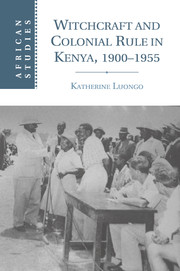Book contents
- Frontmatter
- Contents
- Photographs
- Acknowledgments
- 1 Introduction
- 2 Clans and Councils, Caravans and Conquest, Cosmology and Colonialism
- 3 Understanding Uoi, Uwe, and Kithitu in Ukambani
- 4 The “Cosmology” of the Colonial State
- 5 The Wakamba Witch Trials
- 6 Witchcraft, Murder, and Death Sentences after Rex v. Kumwaka
- 7 The World of Oathing and Witchcraft in Mau Mau–era Machakos
- 8 Cleansing Ukambani Witches
- 9 Epilogue
- Glossary
- Bibliography
- Index
- References
9 - Epilogue
Published online by Cambridge University Press: 07 October 2011
- Frontmatter
- Contents
- Photographs
- Acknowledgments
- 1 Introduction
- 2 Clans and Councils, Caravans and Conquest, Cosmology and Colonialism
- 3 Understanding Uoi, Uwe, and Kithitu in Ukambani
- 4 The “Cosmology” of the Colonial State
- 5 The Wakamba Witch Trials
- 6 Witchcraft, Murder, and Death Sentences after Rex v. Kumwaka
- 7 The World of Oathing and Witchcraft in Mau Mau–era Machakos
- 8 Cleansing Ukambani Witches
- 9 Epilogue
- Glossary
- Bibliography
- Index
- References
Summary
Does the belief in witchcraft avail to an accused person the defence of provocation, and if so, under what circumstances? There is a long line of authorities … to illustrate the vexing nature of the issue both pre- and post the colonial era.
Witchcraft and (Postcolonial) Provocation
On a summer night in Malindi District, Patrick Tuva Mwanengu crept into the home of his kinsmen and hacked to death his uncle, Gona Mwanengu Gona, as Gona slept among members of the family. In the murder trial that followed, the question of witchcraft initially arose on cross-examination as prosecution witnesses testified that they were familiar with allegations that the deceased had practiced witchcraft. The defense counsel subsequently argued that accused’s belief in the witchcraft of the deceased constituted legally mitigating provocation.
In taking up witchcraft and provocation, the trial judge’s directions to the assessors offered startlingly contradictory advice. The judge first offered a straightforward explanation of provocation, emphasizing the elements of proximity and immediacy necessary to establish the legally mitigating condition. In contrast, his directions concerning witchcraft broke with convention. The judge wrote,
Belief in witchcraft is widespread among many communities in Africa. The belief can be deeply entrenched in the believer, who, convinced that the woes in his family are caused by the wizard or witch, will strike the latter without reflection. So that in considering the defence of provocation you must see the wide picture surrounding the claim. The cumulative effect of events culminating with the final blow.
This direction proffered an avenue to treat the (alleged) witchcraft of the deceased as legally mitigating provocation without the necessary conditions of immediacy and proximity being attached.
- Type
- Chapter
- Information
- Witchcraft and Colonial Rule in Kenya, 1900–1955 , pp. 207 - 218Publisher: Cambridge University PressPrint publication year: 2011



